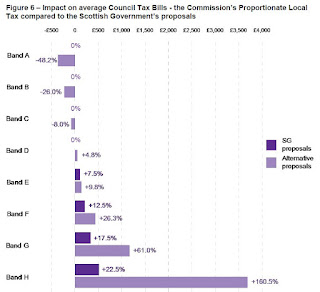Audit Scotland have published their annual Financial
Overview of Councils . It doesn’t paint a happy picture, in fact it should
probably come with a
soundtrack.
The report talks of ‘significant challenges’ for Local
Government finance. If that sounds like
accountant speak for bad things – it is. Boiled down to its absolute basics
they say “All councils face future
funding gaps that require further savings or a greater use of their reserves.”
For “further savings” read “cuts.
The reports says that councils are, generally speaking,
managing their finances well but that funding gaps are developing which will
mean either more cuts or greater use of council reserves. They urge councils to do more long and medium
term financial planning but acknowledges that single year grant funding from
the Scottish Government can cause problems with this.
Overall Council
Spending is at £19.5 billion. This is lower than in 2011/12 although spending
on some services has increased - the most obvious being social care due to
rising demand. Some councils are overspending on their social care budgets and
Audit Scotland warn that this needs to
be tackled (BTW that isn’t accountant
speak for cuts – they mean that councils should be doing better at saying how
much they will be spending on particular services).
Scottish Government grants are councils’ major source of
income. Between 2010/11 and 2015/16, Scottish Government funding (combined
revenue and capital) for councils reduced in real terms by around £186 million
(1.7 per cent) to £10.9 billion. Taking into account 2016/17 funding, councils
have experienced a real-terms reduction in funding of 8.4 per cent since
2010/11.
Councils have usable reserves of £2.5bn that can be used to
support services . Most (23) Councils added to their reserves in the last year.
Reserves can be used to support services but obviously this is not a
sustainable source of long term funding. The Commissions estimate is that
Councils are planning to use a total of £87m ( 75) of total reserves in the coming year to plug gaps in funding .
Reserves are what might be reasonably considered as rainy day money – and it
might be reasonably considered to be wet weather so there use to maintain services and jobs is
a good thing. But as Audit Scotland point out , this is hardly a sustainable
method of funding services.
Recent years have
seen a decrease in the amount of funding coming from Council Tax and in
increase in both the number of services for which councils charge and the
amount charged. Councils are criticised
for not being clear about how charging decisions affect local citizens.
Around 2250 staff
took packages and left Local Government in the last year giving a total
of just over 13 000 staff leaving councils in the last five years . Audit Scotland note that equal pay ‘remains
a substantial issue’ for local government – they will publish a report on this
in 2017
Councils spend around £1.5bn a year on servicing debt. Most tales the form of traditional fixed
interest rate loans. The exceptions to this are PFI /PPP/NPD and LOBO’s (
Lender Option, Borrower Option) loans.
The commission notes that PPP/PFI/NPD predict ( repaymants are often inflation
dependent – so exact repayment levels
are more difficult to plan for) . This just backs up the case that
UNISON Scotland has made that effort needs to go in at both council and
Scottish Government Level to explore
either buying out or Combating
Austerity toolkit these projects. It’s also the case trhat the Public Works
Loan Board isn’t always the cheapest way of doing things either . Some ideas
that might help kget the cost of debt down are explored in our combating
austerity toolkit
Looking ahead Councils are expecting demographic changes to
put demands on key services like social care and are assuming a ride in the
wage bill of between 1%-1.5% in each of the next two years. Overall councils anticipate an £87m in-year shortfall
between their General Fund revenue
income (before using reserves ) and expenditure. That’s after approving savings or cuts of £524m. You hum it he'll play it.
In other news councils
are also urged to do more long and
medium term financial planning but acknowledge that single year grant funding
from the Scottish Government can cause problems with this.
The Audit Commission
are also making it plain that Councillors need to get better at scrutinising
the plans put to them by senior officials Councils need to get better at
explaining their financial position – so that it’s in an understandable format for a wide audience. Being polite accountant types who talk about
savings rather than cuts they don’t say any more than that – but perhaps they
might be thinking that the need for
councils to explain things might be about to go up sharply. For all too obvious
reasons, altogether now




